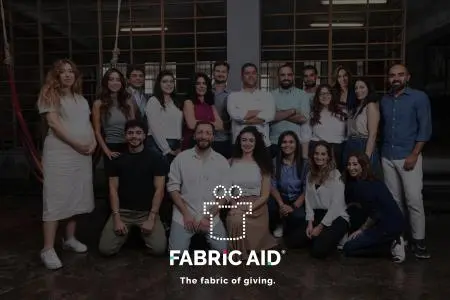PHOTO
Beirut: Clothing has become one of the most consumed goods in our world with clothing consumption rates 400% higher today than they were just two decades ago. More than half of discarded clothing ends up in landfills where it piles up and eventually ends up being incinerated. In parallel, over 77 million people across the Arab world cannot afford to buy new clothing.
FabricAID is a Lebanese social enterprise founded in 2017, tirelessly working to ensure that every individual can afford decent, quality clothing for themselves and their families, and that the fashion industry does no harm to society and the environment.
As the largest second-hand clothing collector in the MENA region, FabricAID is working to establish and scale a socially and environmentally conscious value chain for the apparel industry by optimizing the collection, sorting, upcycling, and resale of second-hand clothes. It does this through a series of socially conscious and sustainable brands targeting diverse socio-economic groups, including the extremely vulnerable.
FabricAID announces today the finalization of its 1.6 million USD seed funding round through investments by Wamda and Alfanar.
FabricAID has raised a total of 2.1 million USD since its inception, and has multiplied sales in 2021 by a factor of five, resulting in over 70,000 beneficiary consumers served to date. To effectively serve growing need and demand, FabricAID now employees nearly one hundred full-time employees.
The seed round extended from 2020 until the end of 2021, and totaled 1.6 million USD making it one of the largest seed rounds for a social enterprise in the region. It included equity investment from venture capital, venture philanthropy impact investment, and angel investors; alongside, development grants and competition awards. Wamda has invested 500,000 USD, giving FabricAID a pre-money valuation of 5 million USD. Alfanar, the Arab region’s first venture philanthropy organisation, has joined the round by investing 100,000 USD at the same valuation.
FabricAID previously raised around 500,000 USD in its pre-seed round, which was completed in 2019. FabricAID’s General Manager Omar Itani insists, “This is a stepping stone, not only for us at FabricAID, but for all social enterprises. Yes, we can be profitable, and have a substantial impact at the same time. Yes, we can attract venture capital and serve our community at the same time, yes, it is possible! “
The round will be used to further strengthen FabricAID’s positioning in Lebanon, expand its operations in Jordan, and launch in Egypt fulfilling its vision of providing clothing for everyone in need in a dignified, sustainable, and environmentally conscious manner.
© Press Release 2022
Disclaimer: The contents of this press release was provided from an external third party provider. This website is not responsible for, and does not control, such external content. This content is provided on an “as is” and “as available” basis and has not been edited in any way. Neither this website nor our affiliates guarantee the accuracy of or endorse the views or opinions expressed in this press release.
The press release is provided for informational purposes only. The content does not provide tax, legal or investment advice or opinion regarding the suitability, value or profitability of any particular security, portfolio or investment strategy. Neither this website nor our affiliates shall be liable for any errors or inaccuracies in the content, or for any actions taken by you in reliance thereon. You expressly agree that your use of the information within this article is at your sole risk.
To the fullest extent permitted by applicable law, this website, its parent company, its subsidiaries, its affiliates and the respective shareholders, directors, officers, employees, agents, advertisers, content providers and licensors will not be liable (jointly or severally) to you for any direct, indirect, consequential, special, incidental, punitive or exemplary damages, including without limitation, lost profits, lost savings and lost revenues, whether in negligence, tort, contract or any other theory of liability, even if the parties have been advised of the possibility or could have foreseen any such damages.




















